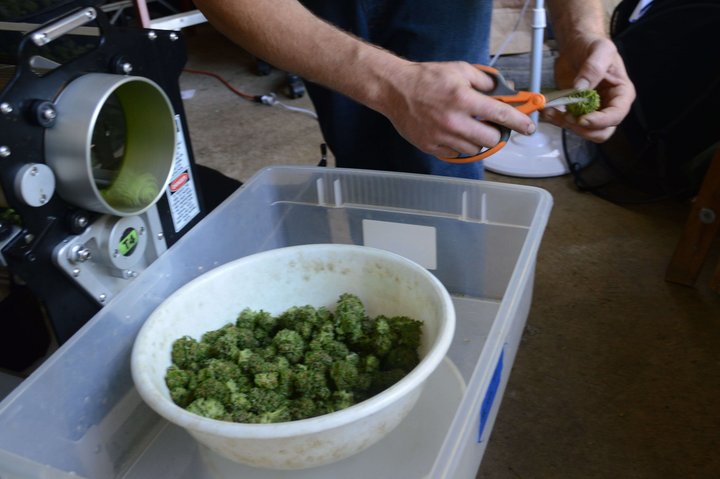
File photo.
State lawmakers are scrambling to develop regulations for California’s legal weed industry before Jan. 1, 2018, when it finally becomes legal for adults to buy marijuana without the cover of a doctor’s recommendation. Regarding that mad scramble, our representative in the California Senate, Mike McGuire, offered an analogy: “We are building the plane while it’s being flown.”
The Legislature now has less than three weeks (until Sept. 15) to pass bills in the current legislative session, and Gov. Jerry Brown has until Oct. 15 to sign them into law or veto them into oblivion.
Both McGuire and Assemblymember Jim Wood have authored or co-authored a variety of bills that, if passed, will have significant impacts on arguably the most significant industry in Humboldt County.
“The new rules and regulations that will be required of cannabis businesses next year are going to be a big change for the industry,” Wood told the Outpost. “We are working to do everything we can to make this transition period as easy as possible.”
Here’s a look at how the current batch of bills from our local lawmakers may impact the industry.
With legitimacy comes taxation. (Or is it vice versa?) Starting Jan. 1, all licensed cultivators in California will have to pay the tax man for their harvested ganja. How much? Per voter-approved Proposition 64 (aka The Control, Regulate and Tax Adult Use of Marijuana Act, or AUMA), the state will levy a tax of $9.25 per ounce of harvested buds bound for the commercial market The rate for leaves, meanwhile, will be $2.75 per ounce, and consumers will pay a 15 percent tax on retail purchases.
When Prop. 64 became law, many growers expressed concern about having to pay taxes at the time of harvest — before the product has been sold. To address these concerns, Wood introduced a bill, coauthored by McGuire, to allow growers to pay their taxes through a licensed distributor, meaning they won’t have to pay the tax man until after they’ve been paid for their product. (Technically, the distributor would pay the tax, just like retailers are responsible for paying the sales tax they collect.)
This was Assembly Bill 1410, and the Humboldt County Board of Supervisors voiced “strong support” for it, as did the Rural Counties Representatives of California (RCRC). While some news organizations and industry websites still have AB 1410 on their lists of bills to watch, this one has effectively been passed. Its wording was inserted into the state’s budget via a trailer bill.
“The language in AB 1410 provided cannabis farmers with options and we are grateful that that bill’s original intent was incorporated into the budget process and we were able to get this put in place ahead of schedule,” Wood wrote in his statement to the Outpost.
Wood also co-authored AB 420 (cue stoner chuckles), which would allow people operating legit marijuana operations to deduct business expenses from their state income taxes, just as other businesses do. “For California’s new cannabis laws to be successful, legal businesses must be able to successfully compete with black market operators,” Wood says on his website. This bill, he believes, would help that effort.
Going back to McGuire’s plane metaphor, you could say that the blueprint for this aircraft was laid out with Prop. 64, while Assembly Bill 64 offers a variety of tweaks on the fly. If passed into law the bill would make it so that:
- Licensed weed businesses could operate as either nonprofit or for-profit entities.
- A retailer or dispensary wouldn’t necessarily need its own brick-and-mortar storefront; it could instead operate as a delivery service.
- Licensed “microbusinesses” — meaning small retailers with farms not exceeding 10,000 square feet — would only be allowed to sell the weed they grew themselves.
- Marijuana advertising would be prohibited on all state highways and interstates.
- The California Highway Patrol would get a $3 million loan from the state’s general fund to come up with protocols to determine whether people are driving while weed-impaired, which has proven difficult to do without getting a blood test.
AB 64 has been set aside by the Appropriations Committee in the Senate. Wood’s office staff said, “We will know one way or the other whether the bill will move forward by this Friday.”
Assembly Bill 1578 has parallels to the ongoing sanctuary city battle between local jurisdictions and the feds. Co-authored by Wood, this bill would prohibit state and local law enforcement agencies from cooperating with federal authorities to “investigate, detain, detect, report, or arrest a person” for marijuana-related activities allowed under state and local laws.
Lastly, McGuire’s Senate Bill 175 is likely to earn many a “good lookin’ out, bro” from Humboldt growers. While the AUMA already prohibits labeling, packaging or marketing weed products with the name of a county unless the weed was actually grown in said county, this bill specifies that those prohibitions would also apply to advertising. In other words, nobody would be allowed to claim “Humboldt grown” in their ads unless their shit was the real deal.
SB 175 is currently in the Assembly’s Agriculture Committee.
The Outpost will keep you updated on these bills as they advance toward either California’s law books or death.
CLICK TO MANAGE